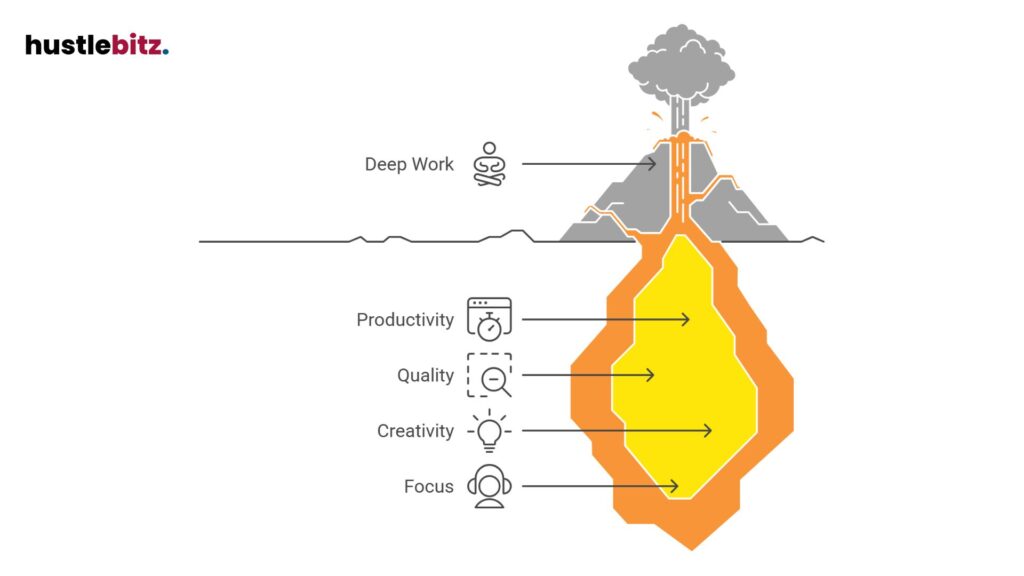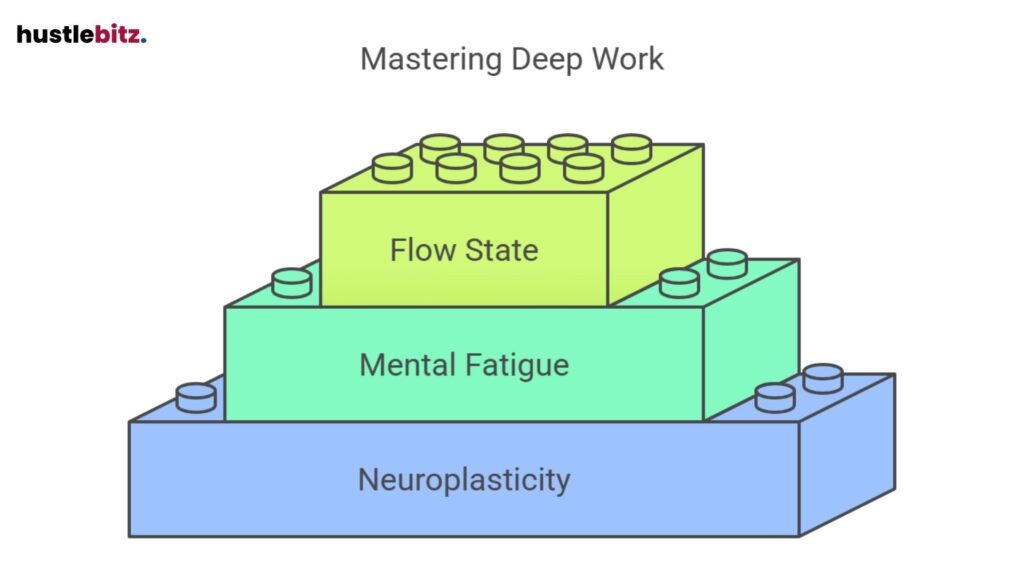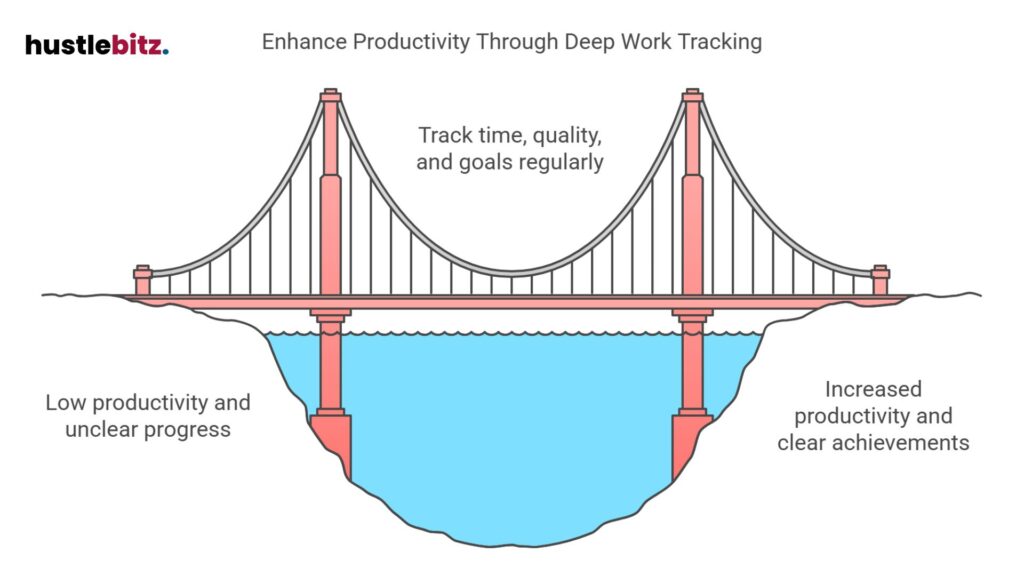Deep work is the ability to focus intensely on cognitively demanding tasks without distractions. This focused approach significantly boosts productivity by enhancing cognitive capabilities and fostering creativity. Unlike shallow work, which involves mundane tasks, deep work leads to the mastery of complex skills and higher quality output. Regular practice of deep work builds mental endurance and reduces fatigue, allowing for better problem-solving and fulfillment. To fully harness the benefits of deep work, one must create an environment conducive to concentration and implement structured work intervals. Unlocking the potential of deep work can lead to notable professional growth and satisfaction. More insights await you.
Key Takeaways
- Deep work is focused, distraction-free concentration on cognitively demanding tasks, essential for mastering complex skills.
- It enhances productivity by eliminating distractions, leading to increased efficiency and higher quality outcomes.
- Regular engagement in deep work builds mental stamina, reducing fatigue and promoting a state of flow for better creativity.
- Creating a dedicated workspace and scheduling specific hours for deep work helps minimize interruptions and enhance focus.
- Tracking deep work sessions and assessing their quality allows for optimization of productivity strategies over time.

Defining Deep Work
What exactly is deep work, and why is it essential for achieving high levels of productivity in today’s distraction-filled environment?
Deep work is a concept popularized by Cal Newport, referring to the ability to focus without distraction on cognitively demanding tasks. The definition of deep work encapsulates this notion as a state of distraction-free concentration that allows individuals to push their cognitive capabilities to their limits. In a time where multitasking and constant interruptions have become the norm, the significance of deep work cannot be overstated.
Engaging in deep work facilitates the mastery of complex skills and the completion of high-quality work that is often unattainable in a distracted state. The benefits of deep work extend beyond mere productivity; they also enhance creativity and problem-solving skills. By immersing oneself in a deep work environment, individuals can produce more in less time, leading to greater efficiency and output.
In contrast to shallow work, which consists of non-cognitively demanding tasks often performed while distracted, deep work requires a commitment to maintaining focus and minimizing interruptions. This commitment is crucial in leveraging one’s full potential and achieving a level of productivity that is increasingly rare in contemporary work settings.
Ultimately, deep work is not just a skill but a vital strategy for thriving in a world that constantly vies for our attention.
The Science Behind Deep Work

Research indicates that deep work significantly enhances cognitive function by allowing the brain to enter a state of heightened focus and efficiency, ultimately leading to improved problem-solving and creativity. The science behind the deep work philosophy highlights how dedicated, uninterrupted periods of concentration foster the ability to work deeply.
This phenomenon can be broken down into three key components:
- Neuroplasticity: Engaging in deep work sessions allows the brain to form new neural connections, enhancing cognitive capabilities over time. This adaptability is crucial for mastering complex tasks and improving overall intelligence.
- Mental Fatigue: The brain’s capacity to maintain deep focus is finite. Regularly committing to deep work helps develop stamina and resilience, reducing mental fatigue while simultaneously boosting productivity. It’s essential to recognize that the commitment to deep work involves training the mind to sustain concentration for extended periods.
- Flow State: Deep work facilitates the entry into a flow state, where individuals experience complete immersion in their tasks. This state is characterized by heightened creativity and efficiency, enabling individuals to produce higher quality work in less time.

Benefits of Deep Work

Engaging in deep work offers numerous benefits, including enhanced productivity, improved cognitive abilities, and a greater sense of fulfillment in one’s professional endeavors.
One of the primary advantages of deep work is the significant boost in productivity it provides. By eliminating distractions and fostering an environment conducive to concentration, individuals can achieve more in a shorter amount of time. This focused approach allows for the completion of complex tasks that require sustained mental effort, which is often unattainable in a fragmented work environment.
Additionally, engaging in a deep work routine can lead to profound improvements in cognitive abilities. When individuals immerse themselves in challenging tasks, they develop their skills and deepen their understanding of the subject matter. This not only enhances their expertise but also fosters a sense of mastery that can be both motivating and rewarding.
Furthermore, the benefits of deep work extend beyond mere productivity. Individuals often report a greater sense of fulfillment and satisfaction when they engage in deep work. The ability to focus intensely on meaningful tasks can lead to a sense of achievement that contributes to overall well-being.
As individuals cultivate their focus and productivity, they become more adept at managing their time and energy, resulting in a more balanced and purposeful professional life.
Distractions and Their Impact

Distractions significantly undermine productivity by interrupting the flow of deep work, leading to fragmented attention and diminished cognitive performance. In today’s digital age, the prevalence of digital distractions has made it increasingly challenging to engage in distraction-free work. These interruptions not only disrupt concentration but also contribute to a cycle of shallow work, where tasks are completed at a superficial level rather than through meaningful engagement.
To understand the impact of distractions on productivity, consider the following points:
- Cognitive Load: Each distraction requires a portion of mental effort to refocus on the task at hand, thereby increasing cognitive load and reducing overall efficiency.
- Time Loss: Frequent interruptions can significantly extend the time needed to complete tasks, as it often takes longer to regain focus after each disruption.
- Quality of Work: Engaging in shallow work due to distractions can lead to lower quality outcomes, as less time and cognitive resources are devoted to complex problem-solving or creative thinking.
Implementing a deep work practice is essential for mitigating the impact of distractions. By creating an environment conducive to sustained focus, individuals can enhance their productivity and produce higher-quality work.
Ultimately, minimizing distractions is crucial for fostering a productive mindset and maximizing the effectiveness of deep work endeavors.
Creating a Deep Work Environment

A well-structured deep work environment is essential for fostering sustained concentration and optimizing productivity.
To effectively create such an environment, individuals and organizations must implement specific deep work strategies that minimize distractions and enhance focus. This begins with designating specific deep work hours during which interruptions are limited, allowing for a more profound engagement with complex tasks.
The physical space plays a crucial role in cultivating a deep work environment. A quiet, organized workspace that is free from clutter can significantly aid in maintaining focus on deep work. Moreover, eliminating digital distractions, such as notifications from smartphones and emails, is vital for preserving mental bandwidth. This intentional separation from distractions allows individuals to immerse themselves fully in their tasks, ultimately leading to the ability to create quality work.
In addition to the physical setup, incorporating rituals or routines can further enhance the deep work environment. For instance, setting clear goals for each deep work session and keeping a consistent schedule can help reinforce the habit of focusing on deep work. Utilizing techniques such as time-blocking or the Pomodoro Technique can also provide structure and encourage sustained effort.
Measuring Your Deep Work Output

To effectively assess the impact of deep work on productivity, individuals must establish clear metrics that accurately reflect their output during focused work sessions. By implementing strategies to measure deep work, one can gain insights into how deep concentration contributes to enhanced productivity.
The following key metrics can serve as a guide to quantify deep work output:
- Time Spent in Deep Work: Track the hours dedicated to deep work sessions. This includes periods where you are fully engaged, free from distractions. Regularly monitoring this can help in identifying patterns and optimizing your schedule for maximum productivity.
- Quality of Output: Evaluate the significance and impact of the work produced during deep work sessions. This may involve assessing the complexity of tasks completed, the creativity of solutions generated, or the level of detail in reports. Establishing criteria for quality can help in measuring the true value of your deep work habits.
- Progress on Goals: Set specific, measurable objectives for your deep work. Periodically review your achievements against these goals. This will not only provide a tangible measure of your progress but also reinforce the importance of deep work in reaching your long-term objectives.

Integrating Deep Work Into Daily Life
Integrating deep work into daily life requires a strategic approach that prioritizes focused effort and minimizes interruptions. To effectively embrace deep work, one must first establish a consistent deep work habit. This can be achieved through deep work scheduling, which allocates specific times during the day for undisturbed concentration on important tasks.
Begin by identifying your peak productivity hours. Many individuals find that early mornings or late evenings are optimal for deep work. During these periods, eliminate distractions by turning off notifications, closing unnecessary tabs, and creating a dedicated workspace. This focused environment is crucial for facilitating deep thought and creativity, allowing you to immerse yourself fully in your projects.
Additionally, consider implementing techniques such as the Pomodoro Technique, which involves working in focused bursts followed by short breaks. This method not only helps maintain concentration but also provides an opportunity to recharge, further enhancing your ability to improve your productivity when returning to deep work.
Furthermore, regularly assess your deep work sessions to identify what strategies are most effective. Experiment with different approaches and adapt your deep work scheduling to fit your unique preferences and work style. By doing so, you will discover personalized ways to boost productivity that align with your goals.
Integrating deep work into daily life is not merely about working harder but working smarter. By committing to this practice, you will cultivate an environment conducive to deep focus, ultimately leading to greater success in both personal and professional endeavors.
Final Thoughts
Embracing deep work as a daily practice can lead to remarkable improvements in productivity, creativity, and overall job satisfaction. By deliberately creating an environment that fosters focus and minimizing distractions, you can maximize your cognitive capabilities and produce higher-quality work in less time. The benefits of deep work extend beyond immediate tasks, contributing to long-term professional growth and mastery of complex skills. Integrating deep work into your routine requires commitment and consistency, but the rewards are substantial—leading to a more fulfilling and successful career. By regularly assessing and refining your deep work habits, you can continue to enhance your productivity and achieve your goals more efficiently.




